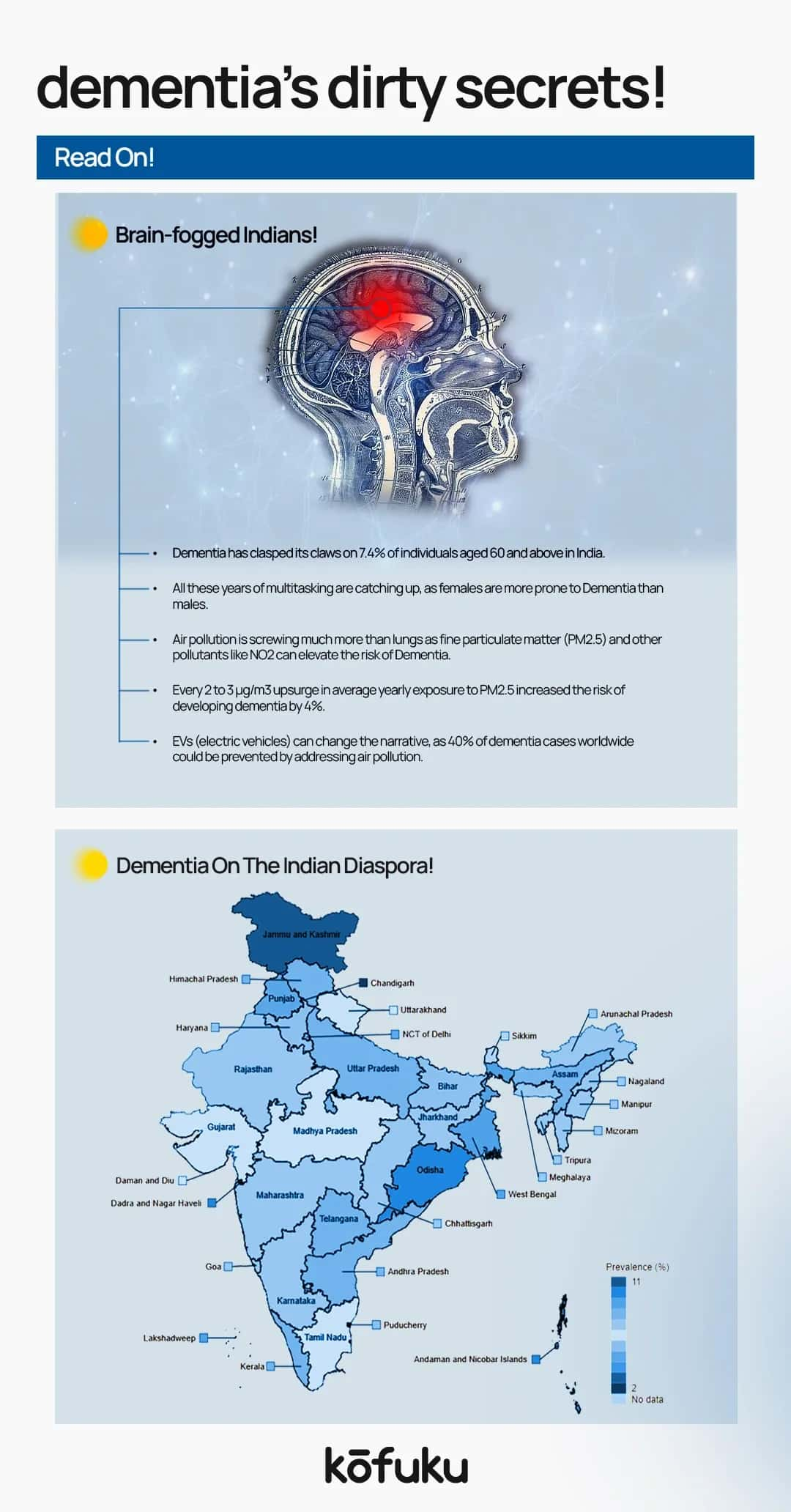Can Traffic-Related Air Be an Unusual Link to Causing Dementia?


Introduction
You’re stuck in traffic again. Horns are blaring, exhaust fumes are swirling, and your playlist just hits that one song you always skip, but sadly, you run out of free swipes too (Spotify issues).
You sigh, roll down your window for a breath of fresh air, and unknowingly, maybe, just maybe, give your brain a whiff of trouble.
Yep, you read it right. Something so ordinary like your daily commute can actually be messing with your mind more than other things. Believe it or not, the air outside can cause trouble to your head, and one of those could be dementia.
Buckle up because this isn’t just a detour into science, it’s a full-on highway to understanding how the fumes we barely think about might be doing more than just hurting our lungs.
But What Exactly Is Dementia?
Dementia is a general term used to describe a decline in cognitive abilities, such as memory, thinking, reasoning, and communication, that is severe enough to interfere with daily life.
It is not a single disease but a group of symptoms caused by various brain disorders, the most common being Alzheimer's disease.
Dementia is progressive, meaning symptoms worsen over time, and it primarily affects older adults, although it is not a normal part of ageing.
Can Traffic-Related Air Cause Dementia?
Traffic-related air pollution isn’t just smoke. It’s a complex soup of nasty stuff - nitrogen oxide, fine particulate matter, black carbon, and more. These particles are teeny-tiny, so small that they can slip past your body’s usual defences, and head straight to your bloodstream and possibly, your brain.
Think of it like glitter on your dress, once you have it on, you can’t really get rid of it despite multiple washes. Same scenario with air pollutants, they travel in your body, sneak past the bloodstream/blood-brain barrier, and potentially cause inflammation to your brain tissue.
So, what’s the connection to Dementia?
A recent study suggests that long-term exposure to traffic pollution may increase the risk of developing dementia.
It’s not just a theory; researchers have observed that people living near busy roads or high traffic zones are more likely to show signs of cognitive decline over time.
Inflammation and oxidative stress triggered by air pollutants may damage neurons or disrupt communication between brain cells.
Over the years, this silent killer could contribute to memory loss, confusion, and cognitive decline that come with conditions like Alzheimer's.
For example, there was a survey conducted on 460,000 people with an average age of 57; those living within 1,000 meters of major roads, where air pollution is typically higher, had a 13–14% greater risk of dementia than those living farther away.
This suggests that reducing air pollution could help lower dementia rates, especially in older populations. People who did not develop dementia were generally exposed to lower levels of air pollution than those who did.

How Can We Prevent It?
Dementia is definitely not curable, but what we can do is prevent it from getting worse or even catching a glimpse of it. I know the idea that your brain could be under attack from your commute is scary, but knowledge is power! Here are some steps to follow -
-
Take the scenic route even if it is long sometimes
-
Keep it green- indoor plants and an air purifier do wonders
-
Reduce exposure to air pollution, such as taking a heavy traffic route
-
Live in areas with less pollution and more greenery
-
Opt for simpler, pollution-free choices, like riding a bicycle instead of driving all the time
-
Advocate for reduced pollution near residential areas and help with cleaning
-
Adopting the air quality guidelines from WHO (such as investing in renewable energy and educating the public)
-
Check the air quality apps if you plan on going for a walk

Conclusion
So, the next time you’re stuck in traffic, think of it more as a patience test, because what else can we do at that time? That cloud of exhaust outside your window could be doing more than fogging up your car; it might be fogging up your mind.
And while we can’t control every puff of pollution, we can make small changes that add up to healthier brains and better commutes. So roll up the windows and continue to jam on your playlist (skip the sad song though, because one crisis at a time).
FAQs
Q. Can air pollution from traffic really cause dementia?
A. Yes, multiple studies suggest that long-term exposure to air pollutants—especially fine particulate matter (PM2.5) and nitrogen dioxide (NO₂) from vehicle emissions—can increase the risk of developing dementia, including Alzheimer’s disease.
Q. What kind of air pollution is most harmful to brain health?
A. The most harmful pollutants for brain health include:
Fine particulate matter (PM2.5): These tiny particles can enter the bloodstream and even reach the brain. Nitrogen dioxide (NO₂): Commonly released from diesel engines. Ultrafine particles and black carbon are associated with heavy traffic areas.
Q. How does traffic-related air pollution affect the brain?
A. Air pollution can cause inflammation, oxidative stress, and damage to blood vessels in the brain. These changes are believed to contribute to the development of neurodegenerative conditions like dementia.
Q. Is this link proven or still being studied?
A. While there is strong evidence for a link, especially from long-term epidemiological studies, scientists are still investigating the exact biological mechanisms and the strength of the association.
The World Health Organisation and many health agencies recognise air pollution as a probable risk factor.
Q. Who is most at risk?
A. People living near busy roads or highways, older adults (especially over 65), those with pre-existing health conditions like cardiovascular disease, and people in urban or industrial areas with high pollution levels.





